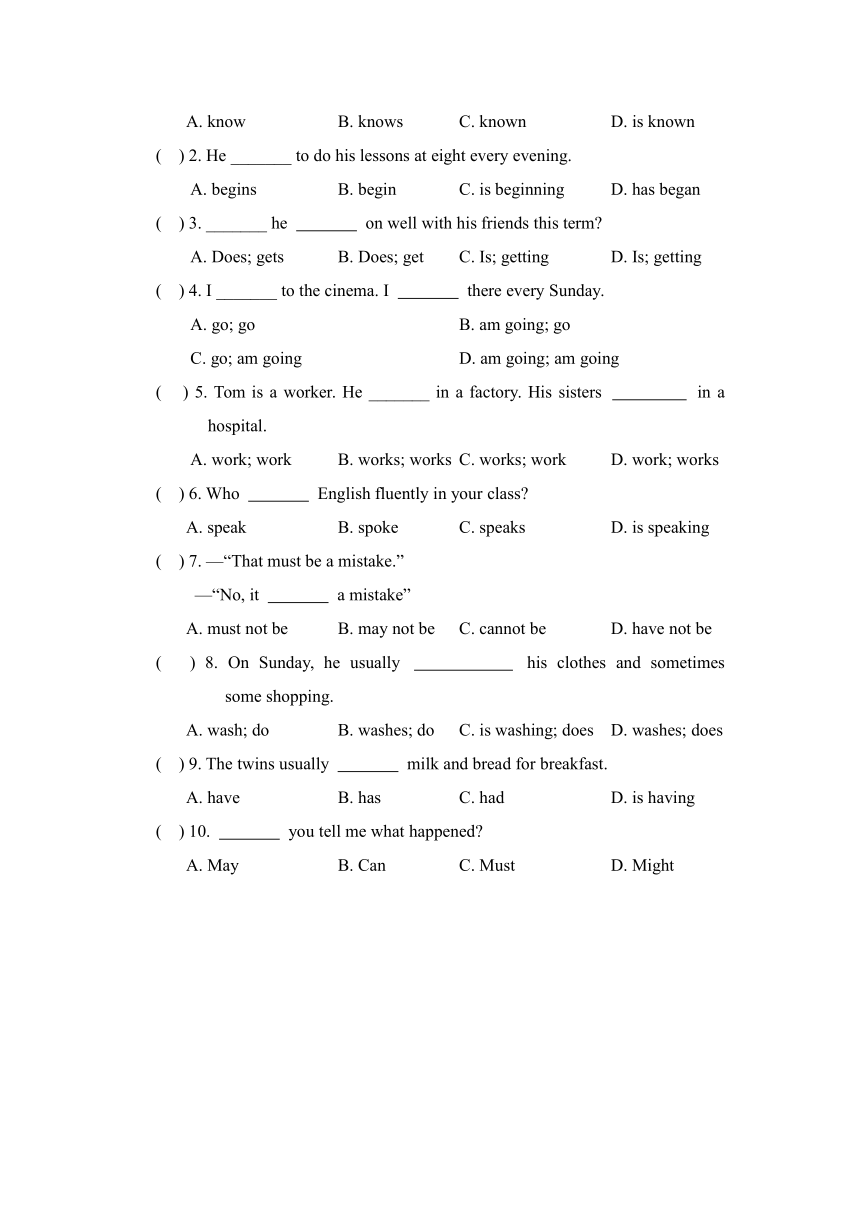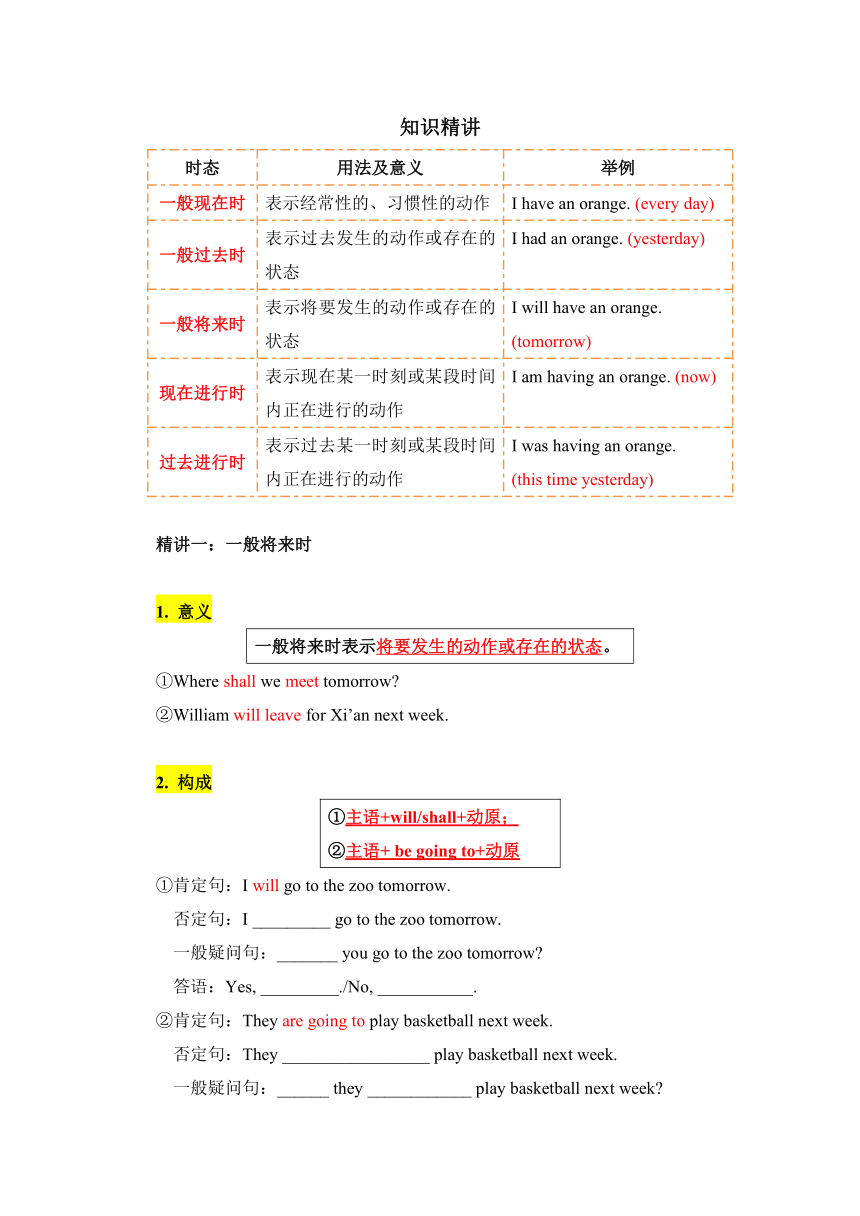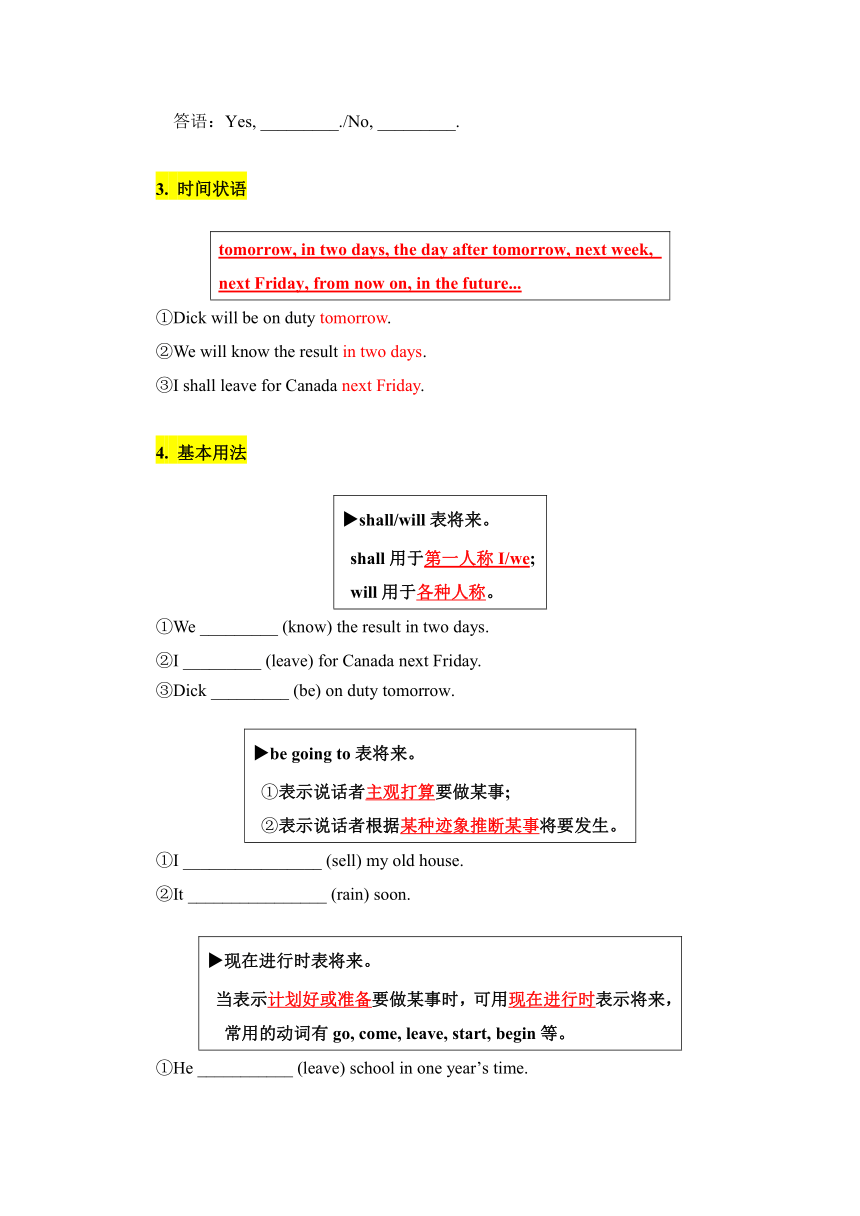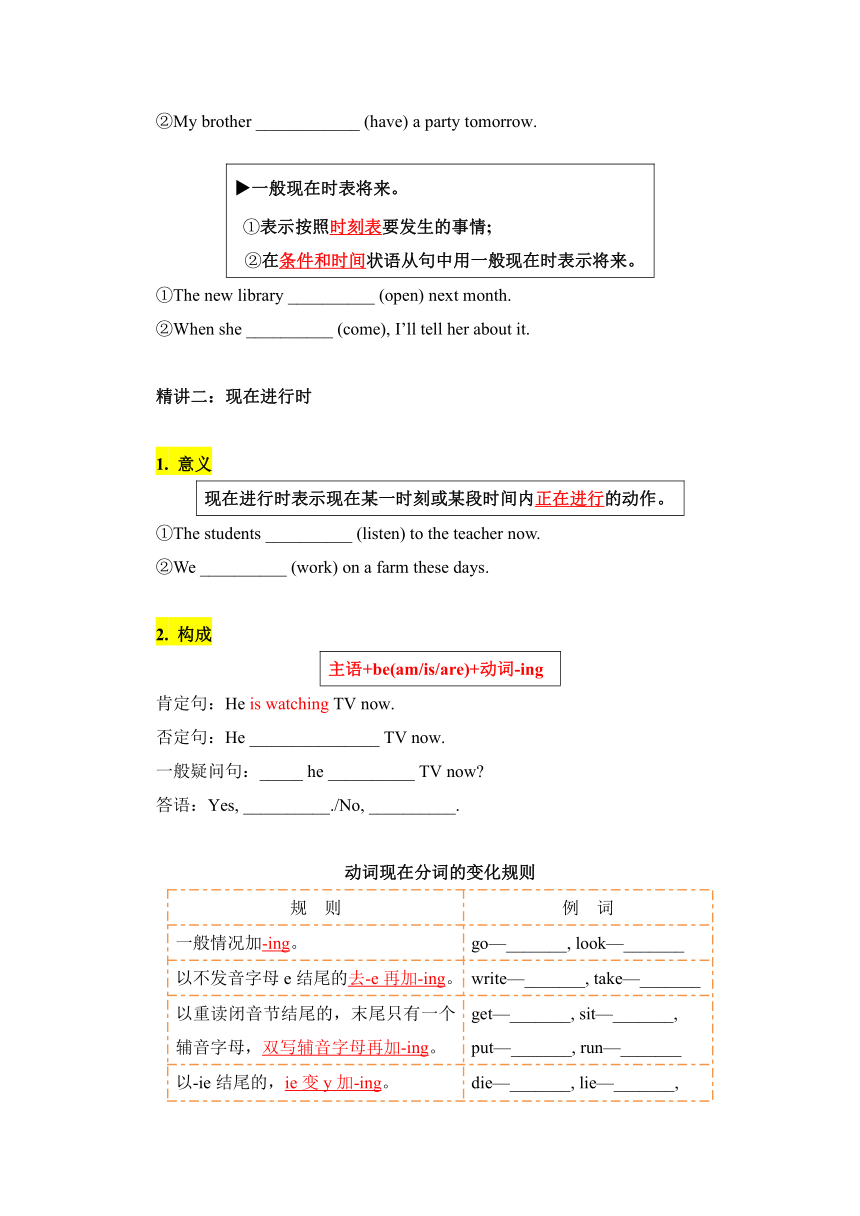2024年人教版中考英语语法精讲-动词时态
文档属性
| 名称 | 2024年人教版中考英语语法精讲-动词时态 |  | |
| 格式 | docx | ||
| 文件大小 | 35.2KB | ||
| 资源类型 | 教案 | ||
| 版本资源 | 人教新目标(Go for it)版 | ||
| 科目 | 英语 | ||
| 更新时间 | 2024-05-10 06:47:48 | ||
图片预览





文档简介
2024年中考英语语法精讲—动词时态
中考考试说明
1. (★★☆☆☆)一般现在时(理解,掌握,分析,运用)
2. (★★★☆☆)一般过去时(理解,掌握,分析,运用)
3. (★★★☆☆)一般将来时(理解,掌握,分析,运用)
4. (★★★★☆)现在进行时(理解,掌握,分析,运用)
5. (★★★★☆)过去进行时(理解,掌握,分析,运用)
6. (★★★★★)现在完成时(理解,掌握,分析,运用)
学校考试说明
考查题型:单项选择、语篇填空
单项选择考点 现在进行时 一般过去时 过去进行时 一般将来时
语篇填空考点 根据语境将动词变化成相应时态填空
第五讲——动词时态
前测
一、用括号中适当的动词填空
1. Li Mei usually (come, comes, coming) to school early.
2. My English teacher _______(play, plays) tennis well.
3. ________(Is, Do, Does) there a cinema in this area(地区)?
4. ________ (Are, Does, Do) they speak English in Brazil
5. It ________(isn’t, don’t, doesn’t) often snow in winter.
二、单项选择
( ) 1. Nobody _______ how to run this machines.
A. know B. knows C. known D. is known
( ) 2. He _______ to do his lessons at eight every evening.
A. begins B. begin C. is beginning D. has began
( ) 3. _______ he on well with his friends this term
A. Does; gets B. Does; get C. Is; getting D. Is; getting
( ) 4. I _______ to the cinema. I there every Sunday.
A. go; go B. am going; go
C. go; am going D. am going; am going
( ) 5. Tom is a worker. He _______ in a factory. His sisters in a hospital.
A. work; work B. works; works C. works; work D. work; works
( ) 6. Who English fluently in your class
A. speak B. spoke C. speaks D. is speaking
( ) 7. —“That must be a mistake.”
—“No, it a mistake”
A. must not be B. may not be C. cannot be D. have not be
( ) 8. On Sunday, he usually his clothes and sometimes some shopping.
A. wash; do B. washes; do C. is washing; does D. washes; does
( ) 9. The twins usually milk and bread for breakfast.
A. have B. has C. had D. is having
( ) 10. you tell me what happened
A. May B. Can C. Must D. Might
知识精讲
时态 用法及意义 举例
一般现在时 表示经常性的、习惯性的动作 I have an orange. (every day)
一般过去时 表示过去发生的动作或存在的状态 I had an orange. (yesterday)
一般将来时 表示将要发生的动作或存在的状态 I will have an orange. (tomorrow)
现在进行时 表示现在某一时刻或某段时间内正在进行的动作 I am having an orange. (now)
过去进行时 表示过去某一时刻或某段时间内正在进行的动作 I was having an orange. (this time yesterday)
精讲一:一般将来时
1. 意义
一般将来时表示将要发生的动作或存在的状态。
①Where shall we meet tomorrow
②William will leave for Xi’an next week.
2. 构成
①主语+will/shall+动原; ②主语+ be going to+动原
①肯定句:I will go to the zoo tomorrow.
否定句:I _________ go to the zoo tomorrow.
一般疑问句:_______ you go to the zoo tomorrow
答语:Yes, _________./No, ___________.
②肯定句:They are going to play basketball next week.
否定句:They _________________ play basketball next week.
一般疑问句:______ they ____________ play basketball next week
答语:Yes, _________./No, _________.
3. 时间状语
tomorrow, in two days, the day after tomorrow, next week, next Friday, from now on, in the future...
①Dick will be on duty tomorrow.
②We will know the result in two days.
③I shall leave for Canada next Friday.
4. 基本用法
shall/will表将来。 shall用于第一人称I/we; will用于各种人称。
①We _________ (know) the result in two days.
②I _________ (leave) for Canada next Friday.
③Dick _________ (be) on duty tomorrow.
be going to表将来。 ①表示说话者主观打算要做某事; ②表示说话者根据某种迹象推断某事将要发生。
①I ________________ (sell) my old house.
②It ________________ (rain) soon.
现在进行时表将来。 当表示计划好或准备要做某事时,可用现在进行时表示将来, 常用的动词有go, come, leave, start, begin等。
①He ___________ (leave) school in one year’s time.
②My brother ____________ (have) a party tomorrow.
一般现在时表将来。 ①表示按照时刻表要发生的事情; ②在条件和时间状语从句中用一般现在时表示将来。
①The new library __________ (open) next month.
②When she __________ (come), I’ll tell her about it.
精讲二:现在进行时
1. 意义
现在进行时表示现在某一时刻或某段时间内正在进行的动作。
①The students __________ (listen) to the teacher now.
②We __________ (work) on a farm these days.
2. 构成
主语+be(am/is/are)+动词-ing
肯定句:He is watching TV now.
否定句:He _______________ TV now.
一般疑问句:_____ he __________ TV now
答语:Yes, __________./No, __________.
动词现在分词的变化规则
规 则 例 词
一般情况加-ing。 go—_______, look—_______
以不发音字母e结尾的去-e再加-ing。 write—_______, take—_______
以重读闭音节结尾的,末尾只有一个辅音字母,双写辅音字母再加-ing。 get—_______, sit—_______, put—_______, run—_______
以-ie结尾的,ie变y加-ing。 die—_______, lie—_______, tie—_______
3. 时间状语
①表示时间:now, right now, these days, this week, at present, all the time, at the moment, ②动作标志:look, listen…
①They are travelling in Europe now.
②Look! He is riding a roller coaster.
4. 基本用法
表示现在(指说话人说话时)正在发生的事情。 常与now, look, listen等词连用。
Look! They _____________ (read) over there under the tree.
表示现阶段正在发生的动作。 常与these days, this week, at present等时间状语连用。
I ________________ (not feel ) well these days.
表示位移的动词,如go, come, leave, move, start, arrive等,用现在进行时表将要发生的动作。
①We __________ (go) to Rome next week.
②He ___________ (leave) Shanghai in a few days.
精讲三:过去进行时
1. 意义
过去进行时表示过去某一时刻或某段时间内正在进行的动作。。
①—What were you doing at eight last night
—I was taking a shower.
②What was Jim doing during the winter holiday
2. 构成
主语+was/were+动词-ing
肯定句:He was watching TV at this time yesterday.
否定句:He _______________ TV at this time yesterday.
一般疑问句:_______ he ____________ TV at this time yesterday
答语:Yes, ____________./No, ____________.
3. 时间状语
at this time yesterday, at that time, at that moment, at 9:00 last night, then 以及when, while, as引导的表示过去的时间状语等
①At that time we were living in the countryside.
②When you phoned yesterday, I was playing computer games.
4. 基本用法
表示过去某一时刻正在进行的动作,常与时间状语at that time, then, at+时刻, at that moment等表示过去的时间状语以及由as, when, while引导的表示过去的时间状语从句连用。
①At half past eight last evening, I ____________ (sleep).
②Jenny ____________ (cook) in the kitchen when you called her at 5 o’clock this afternoon.
在含有when或 while引导的时间状语从句的复合句中,过去进行时的用法:
①表示过去某一时刻一个动作发生时,另一个动作正在进行。
主句(过去进行时) + when引导的时间状语从向(一般过去时)
When the teacher ________ (come) into the classroom, the students __________ (read) aloud.
当老师走进教室的时候,学生们正在大声朗读。
主句(一般过去时) + while引导的时间状语从句(过去进行时)
My sister ________ (come) back while I ___________ (do) my homework.
我正在做作业时,我姐姐回来了。
②表示过去某一时刻两个动作同时进行。
主句(过去进行时) + while引导的时间状语从句(过去进行时)
My mother ___________ (cook) while my brother ___________ (watch TV).
当我弟弟在看电视的时候,我妈妈正在做饭。
5. 过去进行时和一般过去时的区别
过去进行时表示在过去某一时刻或某一段时间正在进行的动作, 强调动作的持续性; 一般过去时表示在过去某个时间发生过的动作或存在的状态; 侧重于事实,且动作已完成。
①I was reading a book that evening. 那天晚上我一直在读书。(___________ )
I read a book that evening. 那天晚上我读了一本书。(___________)
②David was writing a letter to his friend last night. (___________)
大卫昨晚一直在给他的朋友写信。
David wrote a letter to his friend last night. (___________)
大卫昨晚给他的朋友写了封信。
即时训练
1. Susan and her sister ___________ (take) some photos in the park the day after tomorrow.
2. It’s 9:00 in the morning now. The students from Grade Nine ___________ (have) an important exam.
3. —I went to your home yesterday morning, but you weren’t in.
—Well, I ___________ (walk) along the river at that time.
4. Be quiet! The students ___________ (take) an English exam.
5. Next week, each student in the class ___________ (receive) a small gift from their teachers.
6. —I can’t find Sarah. Where is she
—She _________ (prepare) for tomorrow’s Xingcheng Cup speaking competition at home.
7. —Oh! What’s wrong with your finger
—I hurt it while I ___________ (make) a model plane.
8. David fell asleep fast while he ___________ (read) a newspaper.
9. —Were you at home at 9 o’clock last night
—Yes, I ___________ (take) a shower at that time.
10. —What is your plan for next weekend, Lingling
—I ___________ (do) volunteer work in the museum.
后测
( ) 1. In the city, you can often see many people dancing outside if it ________ in the evening.
A. rains B. will rain C. doesn’t rain D. won’t rain
( ) 2. —I called you about an hour ago, but no one answered.
—Oh, sorry. I ________ football in the garden.
A. play B. played C. was playing D. have played
( ) 3. If it ________ next month, all the plants will die.
A. doesn’t rain B. won’t rain C. didn’t rain D. hasn’t rain
( ) 4. —I said hello to you just now, but you didn’t hear me.
—Oh, sorry, I ________ about the coming test at that time.
A. thought B. am thinking C. was thinking D. have thought
( ) 5. Miss Wang ________ Canada tomorrow.
A. is leaving for B. leave for C. left for D. will leaves for
( ) 6. —Are you ________ free tomorrow
—No, I ________ free the day after tomorrow.
A. going to; will B. going to be; will
C. going to; will be D. going to be; will be
( ) 7. When he ________ back, I ________ him the news.
A. will come; will tell B. will come; am going to tell
C. come; will tell D. comes; will tell
( ) 8. There ________ four talk shows on TV next month.
A. is going to be B. is going to have
C. are going to be D. are going to have
( ) 9. —What’s your plan for this weekend
—I ________ to visit my friend. He is in hospital.
A. go B. will go C. going D. went
( ) 10. —What’s your plan for this weekend
—I ________ to visit my friend. He is in hospital.
A. go B. will go C. going D. went
( ) 11. —Could you tell me where you found Miss Gao just now
— Certainly. In the principal’s office. They ________ happily there.
A. are talking B. have talked C. were talking D. talked
( ) 12. —Why are you in such a hurry, John
—There ________ a football match in five minutes.
A. will have B. is having
C. is going to have D. is going to be
中考考试说明
1. (★★☆☆☆)一般现在时(理解,掌握,分析,运用)
2. (★★★☆☆)一般过去时(理解,掌握,分析,运用)
3. (★★★☆☆)一般将来时(理解,掌握,分析,运用)
4. (★★★★☆)现在进行时(理解,掌握,分析,运用)
5. (★★★★☆)过去进行时(理解,掌握,分析,运用)
6. (★★★★★)现在完成时(理解,掌握,分析,运用)
学校考试说明
考查题型:单项选择、语篇填空
单项选择考点 现在进行时 一般过去时 过去进行时 一般将来时
语篇填空考点 根据语境将动词变化成相应时态填空
第五讲——动词时态
前测
一、用括号中适当的动词填空
1. Li Mei usually (come, comes, coming) to school early.
2. My English teacher _______(play, plays) tennis well.
3. ________(Is, Do, Does) there a cinema in this area(地区)?
4. ________ (Are, Does, Do) they speak English in Brazil
5. It ________(isn’t, don’t, doesn’t) often snow in winter.
二、单项选择
( ) 1. Nobody _______ how to run this machines.
A. know B. knows C. known D. is known
( ) 2. He _______ to do his lessons at eight every evening.
A. begins B. begin C. is beginning D. has began
( ) 3. _______ he on well with his friends this term
A. Does; gets B. Does; get C. Is; getting D. Is; getting
( ) 4. I _______ to the cinema. I there every Sunday.
A. go; go B. am going; go
C. go; am going D. am going; am going
( ) 5. Tom is a worker. He _______ in a factory. His sisters in a hospital.
A. work; work B. works; works C. works; work D. work; works
( ) 6. Who English fluently in your class
A. speak B. spoke C. speaks D. is speaking
( ) 7. —“That must be a mistake.”
—“No, it a mistake”
A. must not be B. may not be C. cannot be D. have not be
( ) 8. On Sunday, he usually his clothes and sometimes some shopping.
A. wash; do B. washes; do C. is washing; does D. washes; does
( ) 9. The twins usually milk and bread for breakfast.
A. have B. has C. had D. is having
( ) 10. you tell me what happened
A. May B. Can C. Must D. Might
知识精讲
时态 用法及意义 举例
一般现在时 表示经常性的、习惯性的动作 I have an orange. (every day)
一般过去时 表示过去发生的动作或存在的状态 I had an orange. (yesterday)
一般将来时 表示将要发生的动作或存在的状态 I will have an orange. (tomorrow)
现在进行时 表示现在某一时刻或某段时间内正在进行的动作 I am having an orange. (now)
过去进行时 表示过去某一时刻或某段时间内正在进行的动作 I was having an orange. (this time yesterday)
精讲一:一般将来时
1. 意义
一般将来时表示将要发生的动作或存在的状态。
①Where shall we meet tomorrow
②William will leave for Xi’an next week.
2. 构成
①主语+will/shall+动原; ②主语+ be going to+动原
①肯定句:I will go to the zoo tomorrow.
否定句:I _________ go to the zoo tomorrow.
一般疑问句:_______ you go to the zoo tomorrow
答语:Yes, _________./No, ___________.
②肯定句:They are going to play basketball next week.
否定句:They _________________ play basketball next week.
一般疑问句:______ they ____________ play basketball next week
答语:Yes, _________./No, _________.
3. 时间状语
tomorrow, in two days, the day after tomorrow, next week, next Friday, from now on, in the future...
①Dick will be on duty tomorrow.
②We will know the result in two days.
③I shall leave for Canada next Friday.
4. 基本用法
shall/will表将来。 shall用于第一人称I/we; will用于各种人称。
①We _________ (know) the result in two days.
②I _________ (leave) for Canada next Friday.
③Dick _________ (be) on duty tomorrow.
be going to表将来。 ①表示说话者主观打算要做某事; ②表示说话者根据某种迹象推断某事将要发生。
①I ________________ (sell) my old house.
②It ________________ (rain) soon.
现在进行时表将来。 当表示计划好或准备要做某事时,可用现在进行时表示将来, 常用的动词有go, come, leave, start, begin等。
①He ___________ (leave) school in one year’s time.
②My brother ____________ (have) a party tomorrow.
一般现在时表将来。 ①表示按照时刻表要发生的事情; ②在条件和时间状语从句中用一般现在时表示将来。
①The new library __________ (open) next month.
②When she __________ (come), I’ll tell her about it.
精讲二:现在进行时
1. 意义
现在进行时表示现在某一时刻或某段时间内正在进行的动作。
①The students __________ (listen) to the teacher now.
②We __________ (work) on a farm these days.
2. 构成
主语+be(am/is/are)+动词-ing
肯定句:He is watching TV now.
否定句:He _______________ TV now.
一般疑问句:_____ he __________ TV now
答语:Yes, __________./No, __________.
动词现在分词的变化规则
规 则 例 词
一般情况加-ing。 go—_______, look—_______
以不发音字母e结尾的去-e再加-ing。 write—_______, take—_______
以重读闭音节结尾的,末尾只有一个辅音字母,双写辅音字母再加-ing。 get—_______, sit—_______, put—_______, run—_______
以-ie结尾的,ie变y加-ing。 die—_______, lie—_______, tie—_______
3. 时间状语
①表示时间:now, right now, these days, this week, at present, all the time, at the moment, ②动作标志:look, listen…
①They are travelling in Europe now.
②Look! He is riding a roller coaster.
4. 基本用法
表示现在(指说话人说话时)正在发生的事情。 常与now, look, listen等词连用。
Look! They _____________ (read) over there under the tree.
表示现阶段正在发生的动作。 常与these days, this week, at present等时间状语连用。
I ________________ (not feel ) well these days.
表示位移的动词,如go, come, leave, move, start, arrive等,用现在进行时表将要发生的动作。
①We __________ (go) to Rome next week.
②He ___________ (leave) Shanghai in a few days.
精讲三:过去进行时
1. 意义
过去进行时表示过去某一时刻或某段时间内正在进行的动作。。
①—What were you doing at eight last night
—I was taking a shower.
②What was Jim doing during the winter holiday
2. 构成
主语+was/were+动词-ing
肯定句:He was watching TV at this time yesterday.
否定句:He _______________ TV at this time yesterday.
一般疑问句:_______ he ____________ TV at this time yesterday
答语:Yes, ____________./No, ____________.
3. 时间状语
at this time yesterday, at that time, at that moment, at 9:00 last night, then 以及when, while, as引导的表示过去的时间状语等
①At that time we were living in the countryside.
②When you phoned yesterday, I was playing computer games.
4. 基本用法
表示过去某一时刻正在进行的动作,常与时间状语at that time, then, at+时刻, at that moment等表示过去的时间状语以及由as, when, while引导的表示过去的时间状语从句连用。
①At half past eight last evening, I ____________ (sleep).
②Jenny ____________ (cook) in the kitchen when you called her at 5 o’clock this afternoon.
在含有when或 while引导的时间状语从句的复合句中,过去进行时的用法:
①表示过去某一时刻一个动作发生时,另一个动作正在进行。
主句(过去进行时) + when引导的时间状语从向(一般过去时)
When the teacher ________ (come) into the classroom, the students __________ (read) aloud.
当老师走进教室的时候,学生们正在大声朗读。
主句(一般过去时) + while引导的时间状语从句(过去进行时)
My sister ________ (come) back while I ___________ (do) my homework.
我正在做作业时,我姐姐回来了。
②表示过去某一时刻两个动作同时进行。
主句(过去进行时) + while引导的时间状语从句(过去进行时)
My mother ___________ (cook) while my brother ___________ (watch TV).
当我弟弟在看电视的时候,我妈妈正在做饭。
5. 过去进行时和一般过去时的区别
过去进行时表示在过去某一时刻或某一段时间正在进行的动作, 强调动作的持续性; 一般过去时表示在过去某个时间发生过的动作或存在的状态; 侧重于事实,且动作已完成。
①I was reading a book that evening. 那天晚上我一直在读书。(___________ )
I read a book that evening. 那天晚上我读了一本书。(___________)
②David was writing a letter to his friend last night. (___________)
大卫昨晚一直在给他的朋友写信。
David wrote a letter to his friend last night. (___________)
大卫昨晚给他的朋友写了封信。
即时训练
1. Susan and her sister ___________ (take) some photos in the park the day after tomorrow.
2. It’s 9:00 in the morning now. The students from Grade Nine ___________ (have) an important exam.
3. —I went to your home yesterday morning, but you weren’t in.
—Well, I ___________ (walk) along the river at that time.
4. Be quiet! The students ___________ (take) an English exam.
5. Next week, each student in the class ___________ (receive) a small gift from their teachers.
6. —I can’t find Sarah. Where is she
—She _________ (prepare) for tomorrow’s Xingcheng Cup speaking competition at home.
7. —Oh! What’s wrong with your finger
—I hurt it while I ___________ (make) a model plane.
8. David fell asleep fast while he ___________ (read) a newspaper.
9. —Were you at home at 9 o’clock last night
—Yes, I ___________ (take) a shower at that time.
10. —What is your plan for next weekend, Lingling
—I ___________ (do) volunteer work in the museum.
后测
( ) 1. In the city, you can often see many people dancing outside if it ________ in the evening.
A. rains B. will rain C. doesn’t rain D. won’t rain
( ) 2. —I called you about an hour ago, but no one answered.
—Oh, sorry. I ________ football in the garden.
A. play B. played C. was playing D. have played
( ) 3. If it ________ next month, all the plants will die.
A. doesn’t rain B. won’t rain C. didn’t rain D. hasn’t rain
( ) 4. —I said hello to you just now, but you didn’t hear me.
—Oh, sorry, I ________ about the coming test at that time.
A. thought B. am thinking C. was thinking D. have thought
( ) 5. Miss Wang ________ Canada tomorrow.
A. is leaving for B. leave for C. left for D. will leaves for
( ) 6. —Are you ________ free tomorrow
—No, I ________ free the day after tomorrow.
A. going to; will B. going to be; will
C. going to; will be D. going to be; will be
( ) 7. When he ________ back, I ________ him the news.
A. will come; will tell B. will come; am going to tell
C. come; will tell D. comes; will tell
( ) 8. There ________ four talk shows on TV next month.
A. is going to be B. is going to have
C. are going to be D. are going to have
( ) 9. —What’s your plan for this weekend
—I ________ to visit my friend. He is in hospital.
A. go B. will go C. going D. went
( ) 10. —What’s your plan for this weekend
—I ________ to visit my friend. He is in hospital.
A. go B. will go C. going D. went
( ) 11. —Could you tell me where you found Miss Gao just now
— Certainly. In the principal’s office. They ________ happily there.
A. are talking B. have talked C. were talking D. talked
( ) 12. —Why are you in such a hurry, John
—There ________ a football match in five minutes.
A. will have B. is having
C. is going to have D. is going to be
同课章节目录
